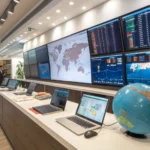- wp-user-a0hy
- 0 Comments
- 495 Views
Visa processing can be slow and complex, but AI is changing this. With advanced tools, AI simplifies and speeds up workflows, benefiting applicants and agencies alike.
Understanding Visa Processing Challenges
Visa processing has its share of challenges. Many people face long delays when applying. Holidays and peak travel seasons often lead to a backlog of applications. Government staff may struggle to keep up, resulting in longer wait times.
Paperwork errors are another common issue. Even small mistakes can cause applications to be rejected. Forms can be confusing, and missing documents lead to frustration. Applicants often need to redo their submissions, wasting time and energy.
The need for improved efficiency is clear. Staff must sift through piles of applications, which can be overwhelming. The entire system feels sluggish, leaving people anxious about their travel plans.
Shifting to AI can address these problems. Automated systems can process applications faster. Countries like the UK and Canada are testing AI to handle these tasks. AI can spot errors in forms and flag incomplete applications. This system can reduce the workload on staff and clear backlogs. With AI, visa processing can become smoother, faster, and more accurate, offering peace of mind for applicants.
The Role of AI in Visa Applications
AI tools play a big role in improving visa applications. For starters, they can handle data entry. Rather than relying on people to fill in forms, AI can automatically extract information from documents. This reduces human error and speeds up the process.
AI also helps verify documents. It can check if a passport is real by comparing it to a database. This way, officials can quickly spot forged or expired documents. Machine learning algorithms keep improving by learning from past data, making them more accurate over time.
Natural language processing is another crucial AI technology. It allows systems to read and understand different languages. This makes it easier for applicants from various backgrounds to submit their paperwork. By analyzing text, AI can flag inconsistencies or missing information.
Some countries already use AI in their visa processes. For example, one nation uses AI to scan thousands of applications and highlight those that need further review. This saves time, making the overall system work better. As these technologies advance, future visa processing will undoubtedly become smoother and faster.
Implementing AI Solutions for Visa Processing
To integrate AI into visa processing, organizations should follow clear steps. First, assess current workflows and identify tasks that can benefit from automation. Focus on repetitive tasks like data entry, which AI can handle efficiently.
Next, invest in training staff. It’s crucial for employees to understand how AI tools work and how they can benefit their daily tasks. This also helps ease any fears about technology replacing jobs. Open communication about AI’s role fosters a positive mindset.
Choosing the right technology is another important task. Look for tools that fit existing systems and meet user needs. They should be adaptable and easy to use. A user-friendly platform improves adoption rates among staff and can lead to better overall performance.
Additionally, implement automation tools to reduce the time spent on mundane tasks. This allows staff to focus on areas that require critical thinking and decision-making. By streamlining processes with AI, organizations can improve efficiency and enhance the applicant experience. This sets a solid foundation for future advancements in visa processing.
Future Outlook on AI and Visa Processing
AI has a bright future in visa processing. We can expect smart systems to make applying for a visa easier. Imagine chatbots answering questions 24/7, guiding applicants through each step. These tools will reduce the number of phone calls and emails, making it simple and fast.
As technology improves, processing times will shrink. AI can quickly scan documents and check facts. This means fewer delays for applicants. Instead of waiting weeks, applicants might get answers in days or even hours.
AI will also help agencies understand visa trends better. By analyzing large amounts of data, systems can spot patterns. This could help identify common reasons for rejections or predict which countries may have more applicants in the future.
Change can feel scary, but it brings many benefits. The tech-driven future of visa processing promises to make lives easier. As we embrace these advancements, we should look forward to simpler processes and happier applicants. Now is the time to welcome this change and enjoy the advantages it offers.
Final words
AI is revolutionizing visa processing, making it quicker and more accurate. Embracing these innovations helps streamline operations and enhances user experiences.





